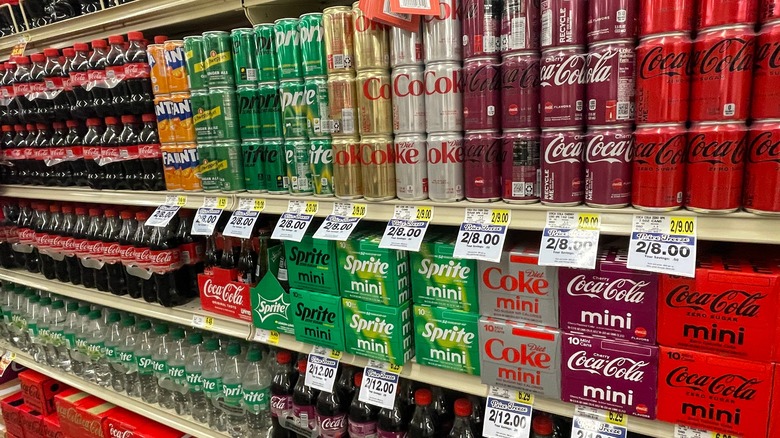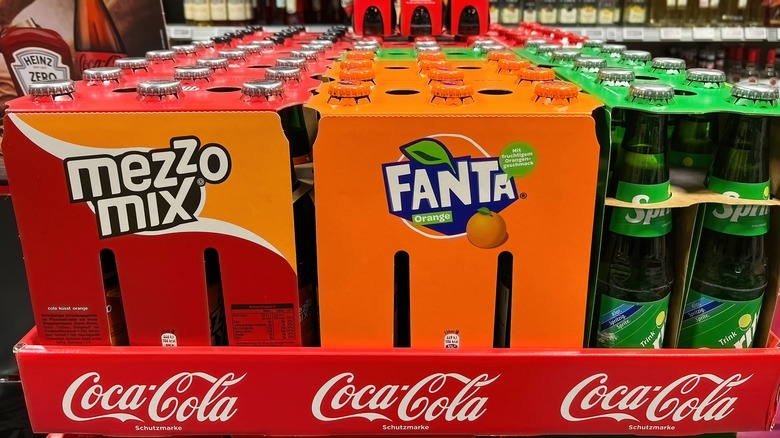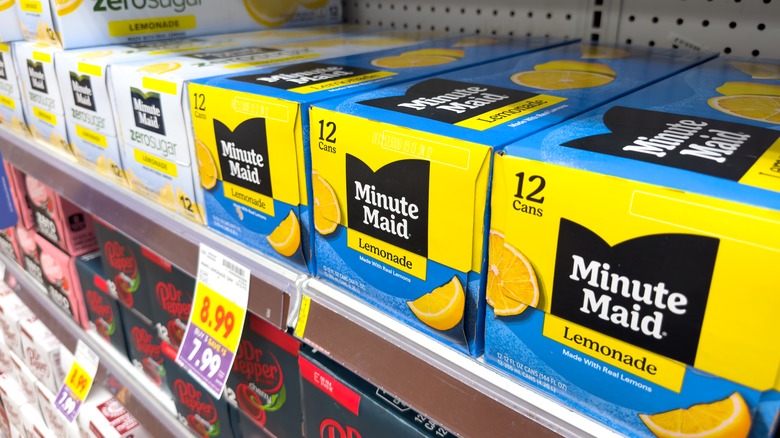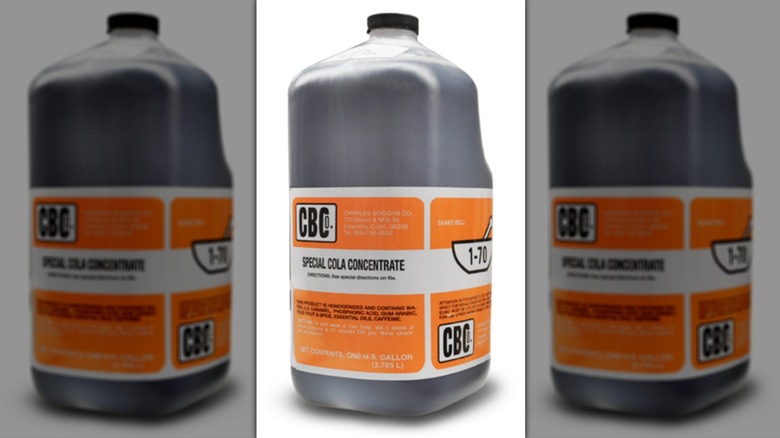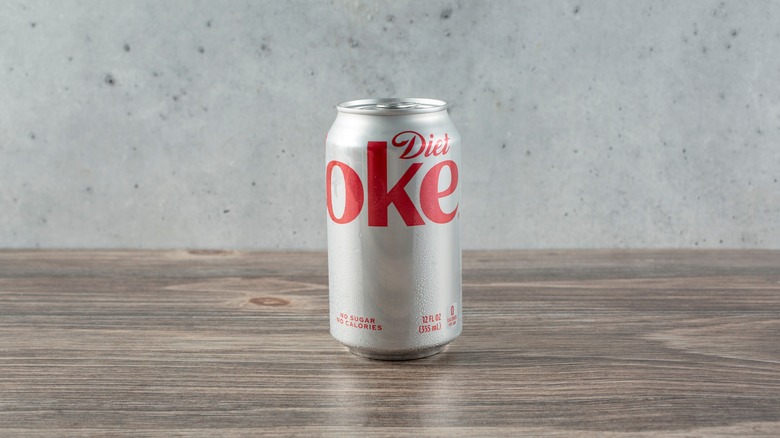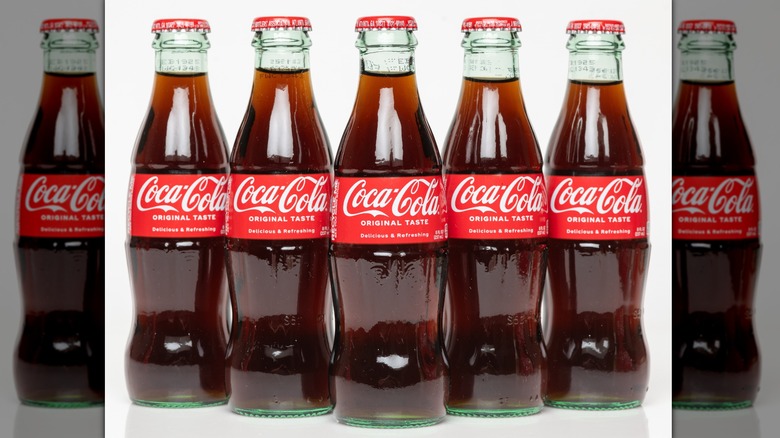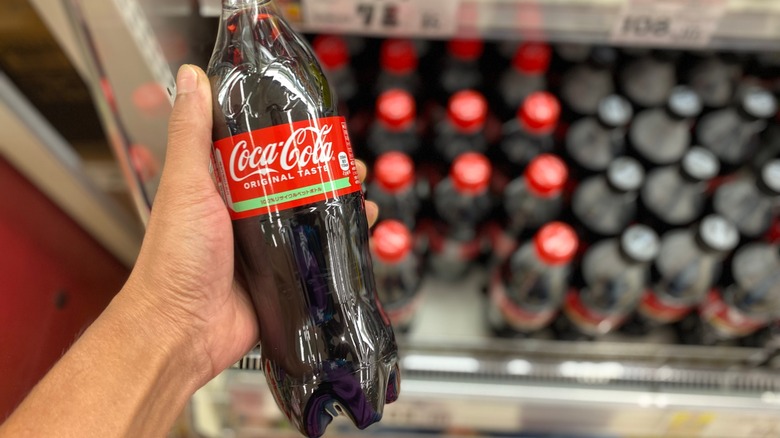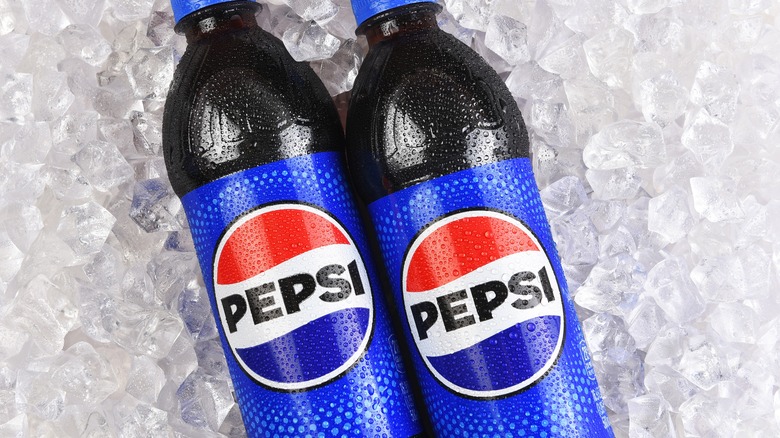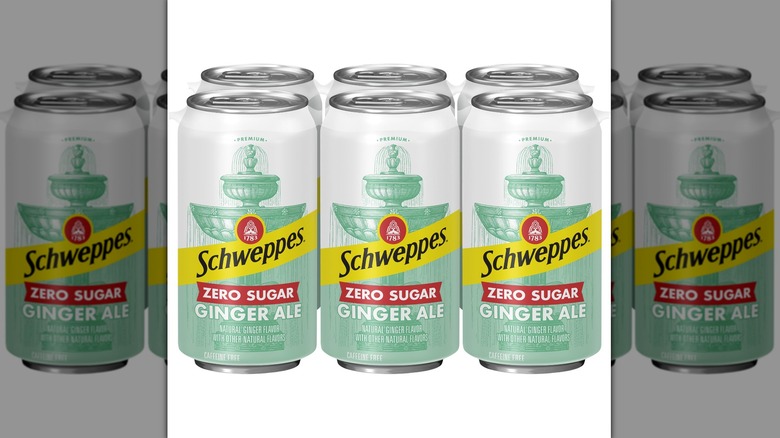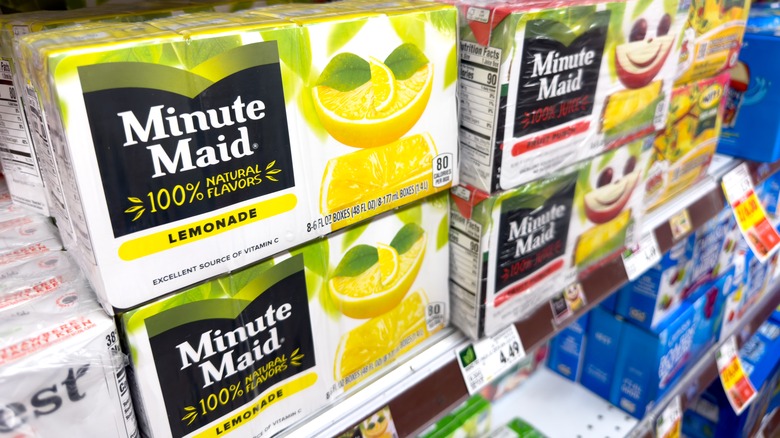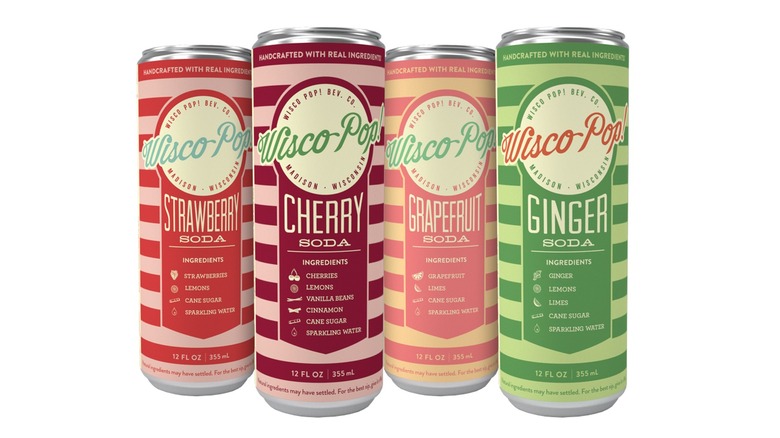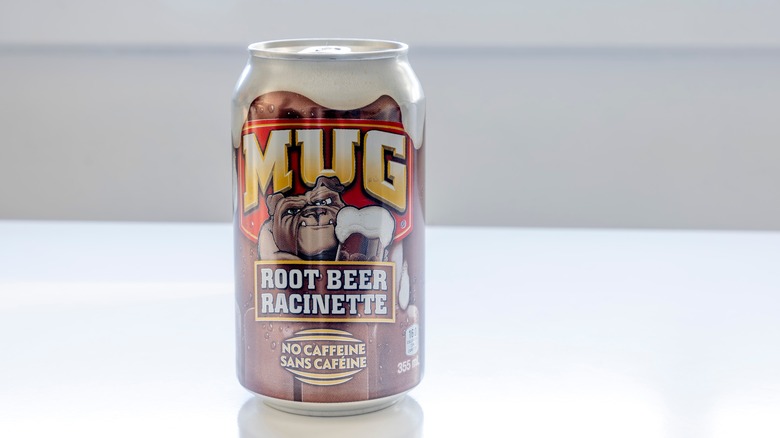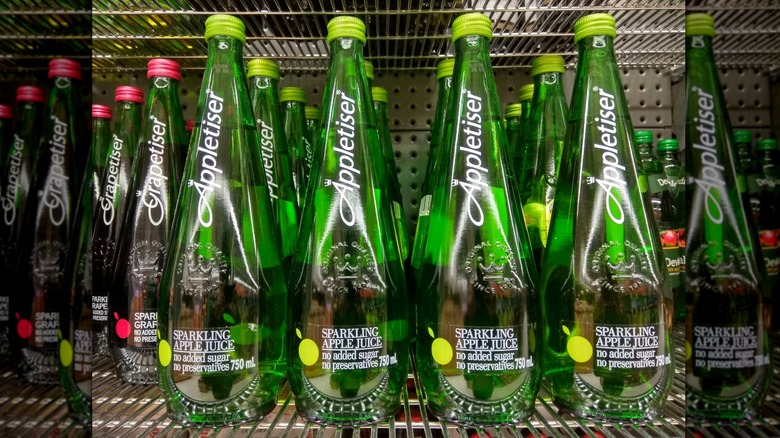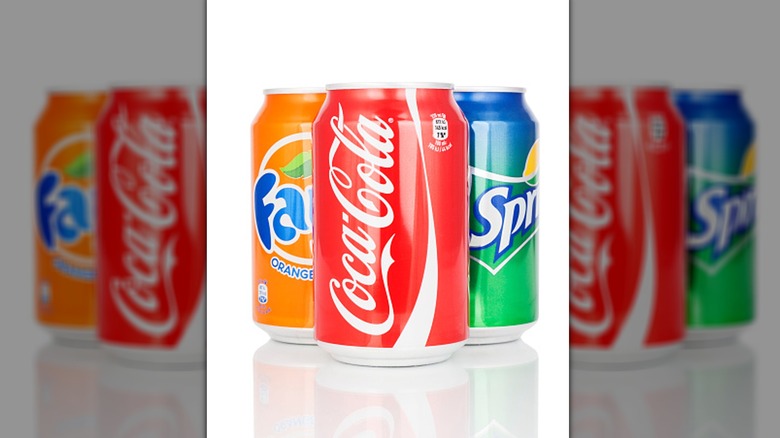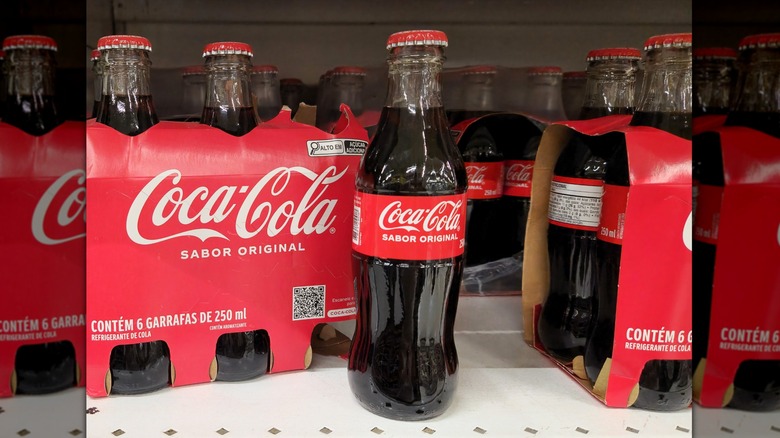Soda Recalls That Affected Millions
We may receive a commission on purchases made from links.
The world's current food system sees huge amounts of food and beverages being produced by a handful of international companies. More often than not, these companies produce and package these products en masse in enormous factories. While this approach means vast amounts of product can be produced and packaged in short periods of time, it also means that a single error can negatively impact a great deal of food or beverages. Mass recalls of everything from cheese to Pepsi are a growing part of daily life. Even restaurants are embroiled with the likes of McDonald's consistently issuing recalls of its own.
As one of the most widely consumed — and thus widely produced — beverages in the world, soda is often recalled for a variety of reasons. These range from the liquid being contaminated with foreign materials to the packaging presenting incorrect nutritional information. When mistakes like this are made, millions of bottles and cans of soda have to be recalled causing fear, disruption, and disgruntlement. As the following soda recalls prove, the impact of a single manufacturing or packaging error has the potential to affect millions of people.
28 million bottles recalled due to potential contaminants
In October 2024, Coca-Cola HBC announced that it was recalling approximately 28 million sodas from Austrian stores. All of the beverages included in the recall were packaged in plastic half liter bottles. This recall was issued amid concerns that these bottles had been contaminated with fragments of metal during the manufacturing process. Of course, these metal fragments posed a huge risk to customers, who could have unwittingly consumed them when they took a drink. This recall stands as Austria's largest in the past quarter century with four different types of soda being affected: Sprite, Coca-Cola, Fanta, and Mezzo Mix.
While 28 million bottles were recalled, it was thought that only a small number of them actually contained metal fragments. The rest were recalled solely as a precautionary measure. Coca-Cola HBC was also quick to point out that no other products were compromised. As a company spokesperson said in a statement recorded by Euro News: "This is a precautionary measure in close cooperation with the Austrian authorities. All other pack sizes and packaging are not affected by this recall."
Over 13,000 cases recalled over sugar content
One month prior to conducting its Austrian recall, Coca-Cola was recalling products on American soil. In this instance, the company recalled 13,152 cases of Minute Maid Zero Sugar Lemonade because the cans were actually filled with the brand's full sugar lemonade. As each case contained 12 cans, the recall encompassed more than 157,000 cans in total. All of these cans were shipped to retail locations in Indiana, Kentucky, and Ohio.
What made this recall all the important was the high levels of sugar that Minute Maid Lemonade contains. In every 250 milliliter serving, this beverage contains 28 grams of sugar. This is a huge amount to accidentally consume, especially for an individual that is trying to limit their sugar intake either for medical reasons or otherwise. It's for this reason that the Food and Drug Administration classified this as a Class II recall, the second most severe.
Approximately 30 gallons recalled due to undeclared preservatives
In March 2024 recalls were initiated for four products produced by the Charles Boggini Company after the Food and Drug Administration found that they contained undeclared preservatives. Of most concern was the company's pink lemonade — a beverage style that has been popular since the 19th century — which was found to contain Red 40, a food dye that has been linked with DNA damage and the early onset of colorectal cancer in scientific papers published by the likes of Toxicology Reports. 28 gallons of this lemonade was recalled along with 112 gallons of the company's Yellow Lemonade and Yellow Lemonade X which contained Yellow 5, a dye that is known to trigger allergic reactions in some consumers. A further recall was issued for 2,723 gallons of Charles Boggini Company's cola base as it contained undeclared sulfites.
All of these four products were recalled from nine states: Connecticut, Pennsylvania, New Jersey, New York, Michigan, Arizona, Illinois, Nevada, and California. While the use of those preservatives listed above is not prohibited, Charles Boggini Company's decision to not declare them on the packaging was. This is because failing to list all the preservatives limits the customer's ability to make informed choices when purchasing or consuming a product.
2,000 cases recalled because of foreign material
During November 2023, The Coca-Cola Company issued a recall that involved three sodas, Diet Coke, Fanta Orange, and Sprite, that'd been distributed to Alabama, Florida, and Mississippi. All three of these sodas were recalled amid concerns they had been contaminated with foreign materials. The nature of this foreign material, or how it ended up in the aluminum cans, was not revealed.
While these three sodas were recalled from the same regions and for the same reason, the number of cases affected by the recall varied from brand-to-brand. 417 cases of Diet Coke were recalled while just 14 cases of Sprite were. Both these numbers pale in comparison to the 1,557 cases of Sprite that were recalled. In total 1,988 cases were recalled, each containing 12 cans of soda. This means just under 24,000 cans of soda were deemed to be unfit for consumption. Thankfully, there were no reports of any people suffering injuries or illness as a result of consuming these sodas.
Million of cases of Coca-Cola recalled in Europe
One of the most alarming soda recalls occurred in 1999 when hundreds of Belgian people, including many school children, fell ill after drinking Coca-Cola and Fanta that'd been packaged in glass bottles. As a result of these illnesses, Belgium, France, the Netherlands, and Luxembourg all initiated nationwide recalls that saw 17 million cases of soda returned to the manufacturer. Further illnesses were reportedly caused by cans of Coca-Cola that were purchased from vending machines.
Those who consumed Coca-Cola and Fanta from glass bottles and those who drank the liquid from cans each suffered from distinct symptoms. The former suffered from nausea and vomiting and these symptoms were linked to use of defective carbon dioxide in the bottling process. The latter had to endure dizziness and headaches and these symptoms were traced to a fungicide that had been used to treat the wooden pallets that the Coca-Cola cans were shipped upon.
While hundreds of people fell ill, and several were hospitalized, nobody suffered serious, long-lasting side effects. However, this huge recall, which remains the company's largest ever, did have a massive impact on Coca-Cola, costing it at least $103 million.
Over 2 million bottles recalled due to iron powder contamination
A recall rocked the Japanese branch of The Coca-Cola Company during 2006 when an initial 500,000 bottles of soda from six brands including Fanta — a product that was formulated in Nazi Germany — Coca-Cola, and Qoo were contaminated with large amounts of iron powder. This powder was thought to have been injected into the liquid due to a faulty piece of equipment. Apparently this fault was worse than initially thought; a few days later, the recall was expanded to include 27 different drink products and a total of 2.4 million bottles of soda. The ensuing recall took place in 13 regions with a focus on Kansai, Hokuriku, and Tokai.
Coca-Cola first became aware of the issue when a customer noted that there was a black powdery substance in their soda. While alarming, company executives noted that the faulty products did not pose a risk to customers, even if the liquid and powder was consumed. Customers were encouraged to return the faulty products to a location in Kawagoe, Saitama Prefecture. Anyone who did had their purchase promptly reimbursed.
Pepsi bottles recalled due to metal contaminants
In 2017, Pepsico received 18 complaints from customers in Michigan who detected a metallic taste when drinking 16.9 ounce bottles of the company's eponymous soda. These complaints led the company to start an investigation which discovered that a malfunctioning piece of bottling equipment was causing fragments of iron and chromium between 0.1 to 0.3 millimeters in length to be added to the soda. Pepsico subsequently issued a state-wide recall for the 16.9 ounce Pepsi-Cola product. No other bottled or canned products were included in the recall.
Despite several customers coming into contact with the affected items, and a great deal of concern that larger pieces of metal might have been introduced to some of the bottles, there were no reports of injuries or illnesses associated with the Pepsi. Affected products were successfully removed from retailers and customers were encouraged to return any affected batches of Pepsi they had bought to the store from which they purchased it.
Zero sugar ginger ale recalled over sugar contents
An internal investigation conducted in March 2024 discovered that Schweppes Zero Sugar Ginger Ale cans had accidentally been filled with the brand's full sugar product. A whopping 233 cases of the faulty product were recalled from retailers in three states: Maryland, Pennsylvania, and West Virginia. It is not known how this mishap occurred.
A 12 fluid ounce serving of Schweppes Ginger Ale contains 33 grams of added sugar. The affected product contained 7.5 fluid ounces of the ginger ale, meaning that, instead of containing no sugar, each individual can actually contained just over 20 grams of sugar. This is nearly half of the amount the Food and Drug Administration recommends an adult consumes in an entire day.
The recall, which was granted Class II status, was completed by the second week of June with all faulty products being removed from store shelves. No customers reported adverse effects from consuming the sugar-filled beverage.
Three Minute Maid products recalled because of metal contaminants
Minute Maid, a Coca-Cola owned brand that specializes in lemonade, made headlines in December 2021 when it was reported that 4,125 cases of Minute Maid Berry Punch, 2,375 cases of Minute Maid Strawberry Lemonade, and 975 cases of Minute Maid Fruit Punch were being recalled due to metal bolts and washers being present in the cartons. Naturally, such an announcement drew widespread alarm and the contaminated products were quickly taken off shelves in eight affected states: Maine, Maryland, New Jersey, New York, Connecticut, Pennsylvania, North Carolina, and Virginia.
While it was not reported how the bolts and washers ended up in the Minute Maid beverages, their presence suggests that an error occurred during the manufacturing or packaging processes. Thankfully, there were no reports or injury or illness associated with these Minute Maid products; a lucky escape considering the choking hazard that the bolts and washers presented.
Wisco Pop! recalls soda because of over-carbonation
In May 2022, the aptly named drinks brand Wisco Pop! recalled all four of its soda flavors after reports that some of the canned sodas were bursting. After an investigation, it was reported that these sodas contained yeast. While harmless in and of itself, this yeast, when stored in warm sugary liquid, fermented causing the soda to become over-carbonated. This carbonation led to an increase in pressure in the cans, causing them to burst. Of course, the act of bursting had the potential to cause serious injuries.
Wisco Pop! was quick to suggest that only a few of the cans actually contained any yeast and that it was only recalling a large amount of product to be on the safe side. While it was not announced how many cases of soda were recalled, the recall initiated by the company was for every single canned soda it'd produced between March and April 2022. This would suggest that the total amount of recalled product was significant.
2,000 cases of root beer recalled over sugar content
In another instance of what seems to be a common error, Pepsico recalled 2,801, 12-pack cases of Mug Root Beer, one of the best tasting root beer products around, in March 2024 when it was discovered that the brand's zero sugar root beer had actually been used to fill the cans. This meant that over 33,600 cans containing the wrong root beer were sent to retailers in six states: Arkansas, Texas, Louisiana, Mississippi, New Mexico, and Oklahoma.
As there was no sugar present in the faulty soda, the recall was only given Class III status by the Food and Drug Administration. This is the lowest possible classification and is reserved for recalls wherein the faulty product is unlikely to cause injury or illness. The recall was successfully completed in a little longer than a month and no customers reported an ill-effect after consuming the sugar-free root beer.
Over 37,000 cases of Appletiser recalled due to mold toxin
In South Africa, Coca-Cola issued a particularly alarming recall when routine testing discovered high levels of the mycotoxin patulin in its Appletiser. Six separate batches tested above the legal limit of 50 parts per billion. As a result, 37,362 cases were recalled by the company during 2021.
Patulin is a toxin produced by several different types of mold. This would suggest that, at some point in the production or bottling process, the Appletiser came into contact with molds such as Aspergillus, Penicillium, or Byssochlamys. Either that, or the apple and apple juice used to make the product was moldy itself. The recall was particularly alarming as ingesting patulin can cause humans to develop a variety of symptoms including nausea, vomiting, and gastrointestinal issues. It is also thought to damage human DNA.
Due to the risks associated with the product, Coca-Cola worked tirelessly to remove the contaminated product from retailers including Boxer, Spar, and OK Foods. Fortunately, there were no reports of any illnesses occurring.
3.2 million cans recalled because of solvent
In 1972, approximately 3.2 million cans of Coca-Cola, Fanta, and Sprite were recalled from across New York. This recall was initiated after 19 customers complained that the aluminum lids used to seal the cans smelled of kerosene. After an investigation, it was discovered that the lids were coated in a solvent that usually would have been burned off. However, a faulty temperature gauge in an oven used to produce the cans meant that this solvent remained intact. In an interview with The New York Times, a spokesperson for the Food and Drug Administration said, "As far as we know the odor causes no serious problem, although it can cause nausea."
While over 3 million cans were recalled, it was estimated that only 16,500 — at the most — aluminum lids were covered in the solvent. This goes to show the extent that the Coca-Cola Company was willing to go to ensure all of the faulty products were removed from the market.
170,000 cases recalled due to mold
In July 1999, the Coca-Cola company recalled 170,000 cases of Coca-Cola, Coca-Cola Light, Fanta, and two brands of water after mold was discovered inside the glass bottles. The recall was initiated after one customer saw visible traces of mold inside a Bonaqua product. Coca-Cola subsequently took the decision to remove all of its glass-bottled products from the Polish market and replace them with products packaged in plastic bottles. The vast majority of the affected products had yet to reach the market and were being stored in warehouses. Nonetheless, over 42,000 cases worth of product had to be recalled from various retailer and venues, including hotels and restaurants.
This recall came only a month after Coca-Cola conducted a massive recall across Belgium, France, the Netherlands, and Luxembourg when hundreds of people fell ill after drinking its products. Speaking to The New York Times after the announcement of Coca-Cola's Polish recall, beverage analyst Caroline Levy said, "I'm kind of in shock that all these things are happening simultaneously. It's a blow to the brand equity, at least in the short term."
